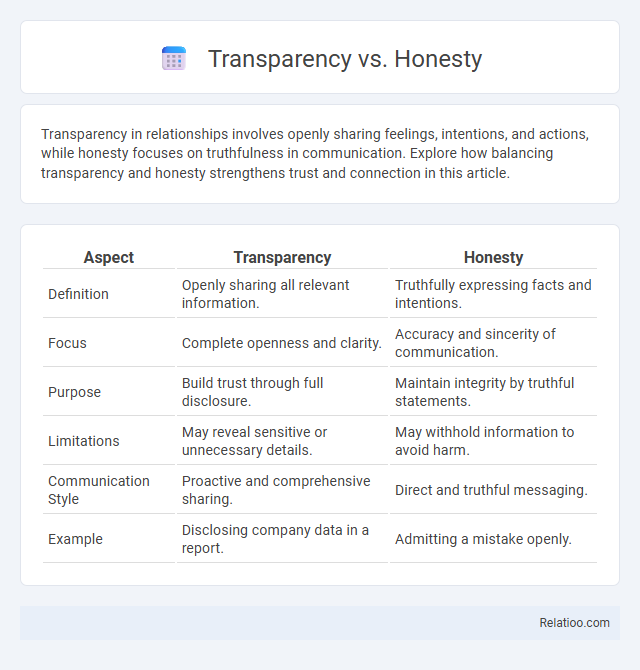Transparency in relationships involves openly sharing feelings, intentions, and actions, while honesty focuses on truthfulness in communication. Explore how balancing transparency and honesty strengthens trust and connection in this article.
Table of Comparison
| Aspect | Transparency | Honesty |
|---|---|---|
| Definition | Openly sharing all relevant information. | Truthfully expressing facts and intentions. |
| Focus | Complete openness and clarity. | Accuracy and sincerity of communication. |
| Purpose | Build trust through full disclosure. | Maintain integrity by truthful statements. |
| Limitations | May reveal sensitive or unnecessary details. | May withhold information to avoid harm. |
| Communication Style | Proactive and comprehensive sharing. | Direct and truthful messaging. |
| Example | Disclosing company data in a report. | Admitting a mistake openly. |
Understanding Transparency and Honesty: Core Definitions
Transparency involves openly sharing information, intentions, and processes to foster trust and clarity, while honesty refers to consistently telling the truth and maintaining integrity in communication. Understanding transparency requires recognizing its role in providing accessibility and openness, whereas honesty emphasizes accuracy and moral truthfulness. Both concepts are essential for building reliable relationships but operate differently: transparency focuses on openness, and honesty centers on truthfulness.
Key Differences Between Transparency and Honesty
Transparency involves openly sharing all relevant information, including processes and intentions, to foster trust and clarity, while honesty specifically refers to truthfulness and accuracy in communication. Key differences include transparency's broader scope of revealing context and rationale, whereas honesty centers on providing factually correct statements without deception. Transparency often requires proactive disclosure, whereas honesty can be reactive and situational.
The Interplay: When Transparency Meets Honesty
Transparency reveals the full context behind actions or decisions, while honesty ensures the truthfulness of the information shared; together, they create a foundation of trust where clarity and integrity coexist. When transparency meets honesty, your communication becomes not only open but also sincere, fostering stronger relationships and informed decisions. Balancing these qualities helps avoid misunderstandings by providing clear, accurate insights into motives and outcomes.
Transparency in Business: Pros and Cons
Transparency in business fosters trust by openly sharing financial data, decision-making processes, and company goals with stakeholders, which can enhance reputation and customer loyalty. However, excessive transparency may expose sensitive information to competitors, potentially compromising strategic advantages and market positioning. Balancing transparency ensures accountability and ethical practices while protecting proprietary data crucial for maintaining competitive edge.
Honesty in Personal Relationships: Building Trust
Honesty in personal relationships fosters deep trust by encouraging open communication and vulnerability, essential for emotional intimacy. Unlike transparency, which involves sharing all information, honesty emphasizes truthful, respectful expression without overwhelming or breaching privacy. Consistent honesty strengthens bonds, reduces misunderstandings, and creates a foundation for lasting, authentic connections.
The Impact of Partial Truths: Transparency Without Full Honesty
Partial truths in transparency can create misleading perceptions that erode trust and damage credibility in relationships and organizations. When transparency lacks full honesty, critical information is omitted, leading to confusion and misinformed decisions. The impact of such selective disclosure highlights the importance of integrating complete honesty to ensure genuine openness and accountability.
Navigating Ethical Dilemmas: Choosing Transparency or Honesty
Navigating ethical dilemmas requires understanding the nuanced differences between transparency, honesty, and openness in communication. Transparency involves sharing comprehensive information, while honesty focuses on truthfulness without withholding critical details. Your choice between these approaches impacts trust and integrity, especially when balancing full disclosure with ethical sensitivity.
Transparency vs Honesty in Leadership
Transparency in leadership involves openly sharing information, processes, and decision-making criteria to build trust, while honesty emphasizes truthfulness and integrity in communication. Effective leaders balance transparency by providing relevant context without overwhelming details, ensuring their honesty maintains credibility and fosters a culture of openness. Prioritizing transparency over mere honesty promotes accountability and empowers teams through clearer understanding of organizational goals and challenges.
Practical Strategies for Balancing Both in Communication
Balancing transparency and honesty in communication requires clear, consistent messaging that respects confidentiality while fostering trust. You can establish practical strategies by setting boundaries on sensitive information and delivering truthful feedback tailored to your audience's needs. Prioritizing openness while maintaining discretion helps strengthen relationships and promotes effective, ethical communication.
The Future of Transparency and Honesty in Society
The future of transparency and honesty in society hinges on the increasing demand for ethical governance and corporate accountability, where digital platforms and blockchain technology enhance real-time information sharing and verification. As societal values shift towards greater openness, transparency serves as a structural foundation, enabling honesty to be consistently demonstrated and trusted. Emerging trends suggest that fostering transparency will drive a cultural transformation that reinforces honesty, strengthening trust in institutions and promoting social cohesion.

Infographic: Transparency vs Honesty
 relatioo.com
relatioo.com